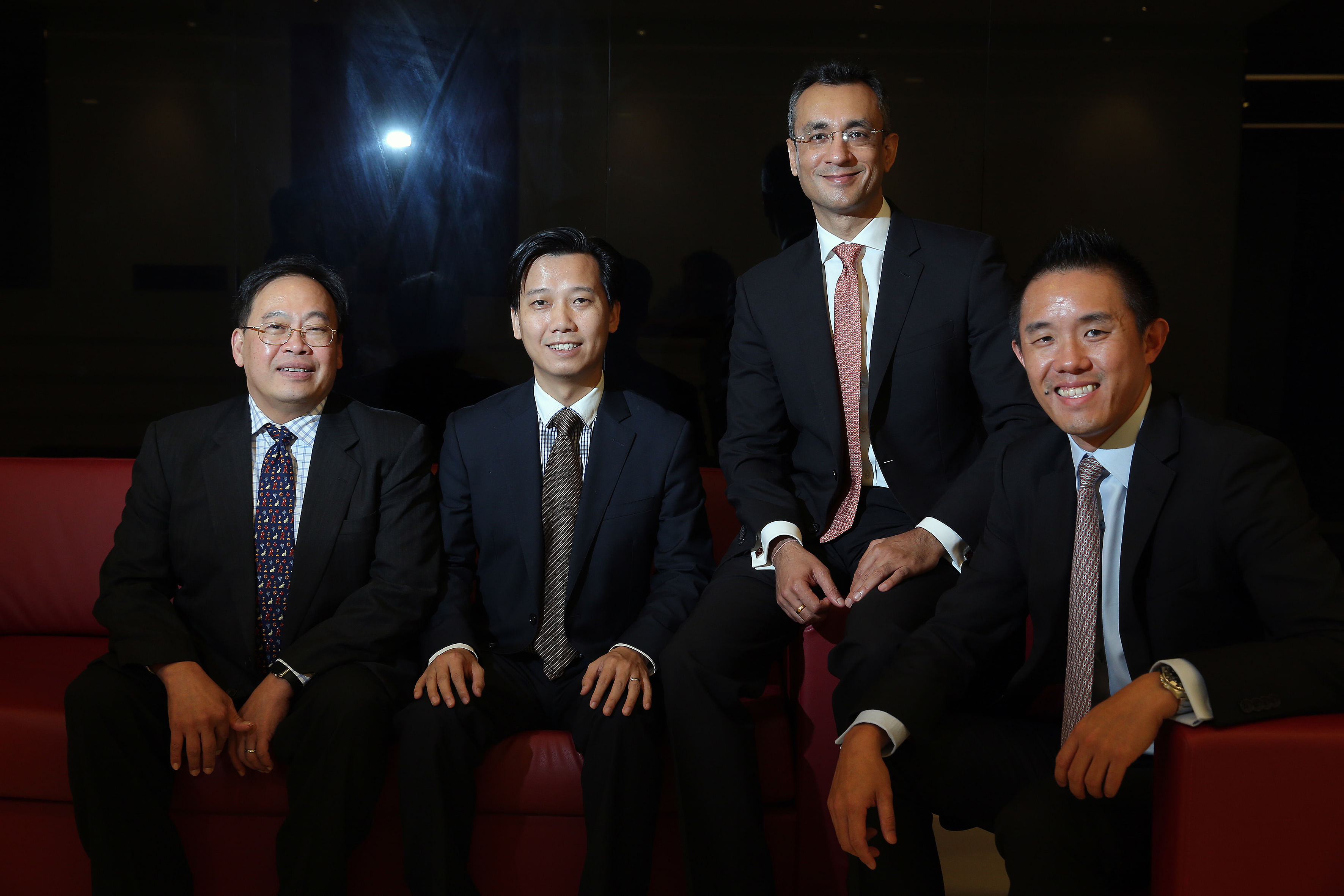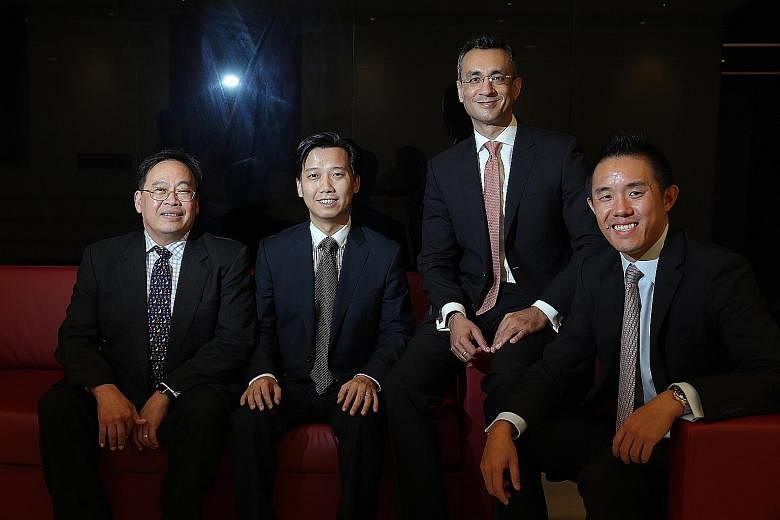This is the eighth part of the Save & Invest Portfolio Series, where we track the performance of three simulated portfolios.
The Sunday Times Invest introduced this series at the start of the year to show how the fortunes of three real retail investors fare.
The investors are 25-year-old Shona Chee, a technical account manager, entrepreneur Getty Goh, 38, who is married with two young children, and retiree Wang Moo Kee, 61.
The Portfolio Series does not involve actual money as it is intended only for illustration and education.
All three portfolios are limited to instruments listed on the Singapore Exchange (SGX) to keep them simple, accessible and easy to monitor and to Singapore Savings Bonds, which can be bought via automated teller machines.

The main asset classes are domestic equities, real estate investment trusts (Reits), global exchange-traded funds (ETFs) and bonds.
While there are similarities in the three portfolio holdings, the allocation for each profile differs, depending on the individual's risk-return objectives and preferences.
The simulated portfolios have been constructed by CFA Society Singapore (CFAS) for an ideal investment time horizon of five to 10 years.
The three portfolios, which went live on Jan 18, are being tracked each month until early next year.

PORTFOLIO PERFORMANCE
Last month saw a watershed event when Britain surprised the world by opting out of the European Union in a cliffhanger "Brexit" referendum, with the vote largely driven by nationalist and anti-immigration sentiments.
The CFAS panel said: "The real socio-economic impact of Brexit will be known only in the long term. Its ramifications are still being worked out since the global economic landscape is very intricately intertwined.
"Thus, while global equities sharply sold off upon the declaration of Brexit, they recovered with equal rapidity as the world digested the news."

June also saw a marginal improvement in PMI (Purchasing Managers Index) in the West. But it would be too soon to believe that growth has returned. Results in in Asia have been mixed. Manufacturing in China continues to cool, with Japan, Singapore and Malaysia stagnating. India and Indonesia, being less exposed to swings in external demand, are doing better.

The panel noted that the Brexit vote also triggered currency volatility, with the pound taking a beating against the euro and the United States dollar. The Singdollar gained marginally against the greenback and even the Straits Times Index ended the month in positive territory. One of the best-performing assets globally was gold, being a traditional safe haven.
The CFAS panel noted: "Our view is that the main growth engines of the world - US and China - will continue to struggle. As a consequence the probability of interest rate hikes in the US will keep getting pushed out into the future.
"With low growth and inflation, oil too will remain low for longer. In such an environment, bond yields can potentially dip lower and corporate performance will remain under stress."
The half-year report card shows that all three portfolios have delivered positive returns since inception, thanks mainly to the Singapore-listed equities and Reits.
Ms Chee's portfolio was up 3.93 per cent as at the end of June, Mr Goh's had advanced 4.8 per cent while Mr Wang's portfolio recorded the highest growth at 5.34 per cent.
All portfolios have exposure to global assets as a diversification mechanism. Among the non-Singapore assets, gold has done exceptionally well.
-
Save & Invest Portfolio Series
-
The Save & Invest Portfolio Series features the simulated portfolios of a young working adult, a married couple with two young children and a retiree over a 12-month period.
It guides retail investors in basic investment techniques and on how to build a portfolio in line with their financial goals and risk tolerance. This initiative involves the Singapore Exchange collaborating with CFA Society Singapore and MoneySense, the national financial education programme.
The CFAS panellists who track the simulated portfolios are Mr Phoon Chiong Tuck, head of fixed income at Lion Global Investors, Mr Jack Wang, partner at Lexico Capital, Mr Praveen Jagwani, chief executive of UTI International, Singapore, and Mr Simon Ng, CEO of CCB International (Singapore).
In domestic equities, Singapore Airlines stock continues to be a drag on performance. But on a relative basis, with a dividend yield of 4.6 per cent, the CFAS panel finds it attractive.
All three portfolios registered gains last month. Each portfolio has a different benchmark that best reflects the portfolio mix.
Ms Chee's portfolio was up 1.4 per cent for the month, beating the benchmark (1.01 per cent) by 0.39 per cent; Mr Goh's was up 0.6 per cent, beating the benchmark (0.21 per cent) by 0.39 per cent; and Mr Wang's portfolio was up 0.64 per cent, trailing the benchmark (1.53 per cent) by 0.89 per cent.
The ETF (mainly due to a strong rally in gold) and Reit (rebound in A-Reit) allocations outperformed their respective benchmarks for the month, and explain the outperformance of Ms Chee's and Mr Goh's portfolios.
But this was offset by the Singapore equities and bond allocations (iShares Asia Credit Bond ETF and CMA 3.8 per cent Jan 22 ended the month lower), which underperformed their benchmarks.
Singapore Government Bonds rallied with the uncertainty surrounding Brexit contributing to the strong performance for the month for the bond benchmark (up 1.82 per cent). The US dollar also weakened against the Singdollar in June, contributing to the negative performance for the iShares Asian Credit Bond ETF which holds US-dollar bonds, as its price (converted back into Singdollars) was negatively impacted.
None of the portfolios holds Singapore Government Bonds directly and suffered as a consequence, with Mr Wang's portfolio impacted the most due to the larger allocation to bonds in his portfolio.
REBALANCING PORTFOLIOS
As part of the rebalancing exercise, the CFAS panel decided to sell off the position in ComfortDelgro, driven primarily by its large earnings in sterling, a currency that has weakened considerably.
Another area of concern on ComfortDelgro is the threat of private hire car services such as GrabCar and UberX, on the firm's taxi business, of which Singapore contributes the majority of its taxi revenue.
The CFAS panel said: "In its place we have added SingPost, which we think could potentially be a turnaround story. Most of the bad news around corporate governance issues is now known and the stock seems undervalued."
As a reaction to the uncertainty triggered by Brexit, the panel has terminated Mr Goh's exposure to European equities and sold a little bit of China too. In its place, it added exposure to Indian equities and marginally increased allocation to gold and Asian equities.
Similarly for Mr Wang, the panel sold off ComfortDelgro and the ETF on euro equities and trimmed the DBS holding to make space for SingPost and added to the gold ETF stake. •The CFAS panellists will be speaking at the SGX Pavilion @ 2016 Invest Fair on July 30 and 31 at Suntec Convention & Exhibition Centre, level 4, hall 401-403. Retail investors will have the opportunity to seek one-on-one portfolio advice from investment and wealth specialists to plan for their financial future. For more details, visit http://sg2016.invest-fair.com



